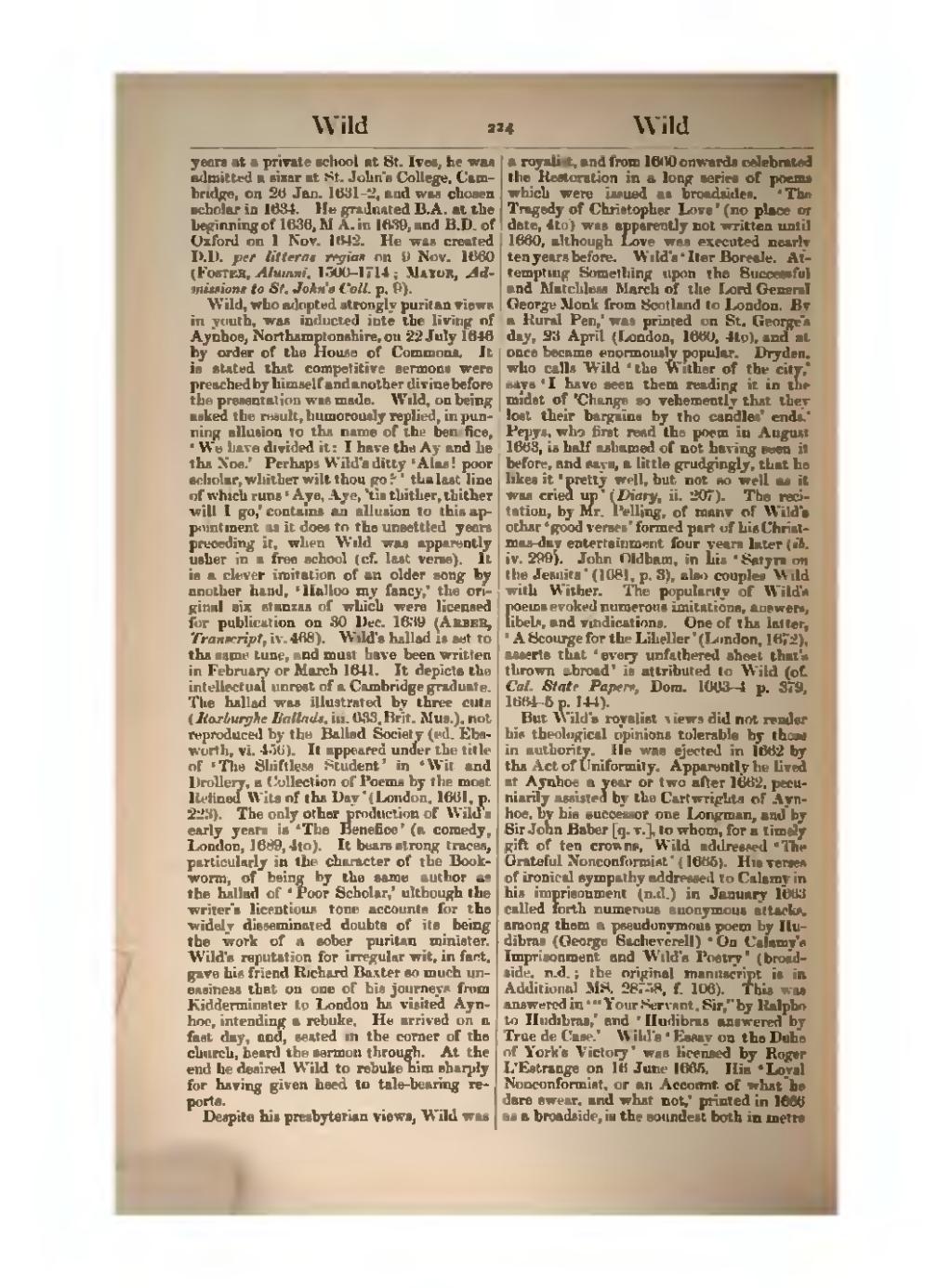years at a private school at St. Ives, he was admitted a sizar at St. John's College, Cambridge, on 26 Jan. 1631-2, and was chosen scholar in 1634. He graduated B.A. at the beginning of 1636, M.A. in 1639, and B.D. of Oxford on 1 Nov. 1642. He was created D.D. per litteras regias on 9 Nov. 1660 (Foster, Alumni, 1500-1714; Mayor, Admissions to St. John's Coll. p. 9)
Wild, who adopted strongly puritan views in youth, was inducted into the living of Aynhoe, Northamptonshire, on 22 July 1646 by order of the House of Commons. It is stated that competitive sermons were preached by himself and another divine before the presentation was made. Wild, on being asked the result, humorously replied, in punning allusion to the name of the benefice, 'We have divided it: I have the Ay and he the Noe.' Perhaps Wild's ditty 'Alas ! poor scholar, whither wilt thou go?' the last line of which runs 'Aye, Aye, 'tis thither, thither will I go,' contains an allusion to this appointment as it does to the unsettled years preceding it, when Wild was apparently usher in a free school (cf. last verse). It is a clever imitation of an older song by another hand, 'Halloo my fancy,' the original six stanzas of which were licensed for publication on 30 Dec. 1639 (Arber, Transcript, iv. 468). Wild's ballad is set to the same tune, and must have been written in February or March 1641. It depicts the intellectual unrest of a Cambridge graduate. The ballad was illustrated by three cuts (Roxburghe Ballads, iii. 633, Brit. Mus.), not reproduced by the Ballad Society (ed. Ebsworth, vi. 456). It appeared under the title of 'The Shiftless Student' in 'Wit and Drollery, a Collection of Poems by the most Refined Wits of the Day '(London, 1661, p. 223). The only other production of Wild's early years is 'The Benefice' (a comedy, London, 1689, 4to). It bears strong traces, particularly in the character of the Bookworm, of being by the same author as the ballad of 'Poor Scholar,' although the writer's licentious tone accounts for the widely disseminated doubts of its being the work of a sober puritan minister. Wild's reputation for irregular wit, in fact, gave his friend Richard Baxter so much uneasiness that on one of his journeys from Kidderminster to London he visited Aynhoe, intending a rebuke. He arrived on a fast day, and, seated in the corner of the church, heard the sermon through. At the end he desired Wild to rebuke him sharply for having given heed to tale-bearing reports.
Despite his presbyterian views, Wild was a royalist, and from 1660 onwards celebrated the Restoration in a long series of poems which were issued as broadsides. 'The Tragedy of Christopher Love' (no place or date, 4to) was apparently not written until 1660, although Love was executed nearly ten years before. Wild's 'Iter Boreale. Attempting Something upon the Successful and Matchless March of the Lord General George Monk from Scotland to London. By a Rural Pen,' was printed on St. George's day, 23 April (London, 1660, 4to), and at once became enormously popular. Dryden. who calls Wild 'the Wither of the city,' says 'I have seen them reading it in the midst of 'Change so vehemently that they lost their bargains by the candles' ends.' Pepys, who first read the poem in August 1663, is half ashamed of not having seen it before, and says, a little grudgingly, that he likes it 'pretty well, but not so well as it was cried up' (Diary, ii. 207). The recitation, by Mr. Pelling, of many of Wild's other 'good verses' formed part of his Christmas-day entertainment four years later (ib. iv. 299). John Oldham, in his 'Satyrs on the Jesuits' (1681, p. 3), also couples Wild with Wither. The popularity of Wild's poems evoked numerous imitations, answers, libels, and vindications. One of the latter, 'A Scourge for the Libeller' (London, 1672), asserts that 'every unfathered sheet that's thrown abroad' is attributed to Wild (cf. Cal. State Papers, Dom. 1663-4 p. 379, 1664-5 p. 144).
But Wild's royalist views did not render his theological opinions tolerable by those in authority. He was ejected in 1662 by the Act of Uniformity. Apparently he lived at Aynhoe a year or two after 1662, pecuniarily assisted by the Cartwrights of Aynhoe, by his successor one Longman, and by Sir John Baber [q. v.], to whom, for a timely gift of ten crowns, Wild addressed 'The Grateful Nonconformist' (1665). His verses of ironical sympathy addressed to Calamy in his imprisonment (n.d.) in January 1668 called forth numerous anonymous attacks, among them a pseudonymous poem by Hudibras (George Sacheverell) 'On Calamy's Imprisonment and Wild's Poetry' (broadside, n.d.; the original manuscript is in Additional MS. 28758, f. 106). This was answered in '"Your Servant, Sir," by Ralpho to Hudibras,' and 'Hudibras answered by True de Case.' Wild's 'Essay on the Duke of York's Victory' was licensed by Roger L'Estrange on 15 June 1665. His 'Loyal Nonconformist, or an Account of what he dare swear, and what not,' printed in 1666 as a broadside, is the soundest both in metre
